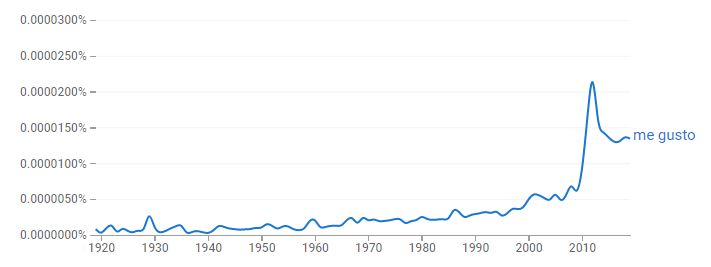I was reading through a Duolingo discussion thread when I came across the question:
But why is it "me llamo" and not "me llama", but "me gusta" and not "me gusto"?
I was about to answer with "because gustar is not reflexive," but then I got to wondering if that was really true. I then got to wondering, How do I say "I like myself"?
So, I searched the web for an answer. I came across many a page that told me that gustar is not reflexive. I even went to the Diccionario de la lengua española, and sure enough, I got this:
Nevertheless, when I went to Reverso and searched for Spanish translations of "I like myself," I discovered at least 12 examples of some form of "me gusto" (which is what I had been expecting).
And as if that weren't enough, Google's Ngram shows plenty of examples of "me gusto":
So, while I want to answer this question, I am a little uncertain on how to go about it. I decided that posting this question here to get some insight from experts would be a good place to start.
Si "gustarse" no existe en la lengua española, ¿por qué "me gusto" ha llegado a la lengua?
Estaba leyendo un hilo de discusión de Duolingo cuando me encontré con la pregunta:
[Véanse arriba en la sección inglesa.]
Estaba a punto de responder con "porque gustar no es reflexivo", pero luego me puse a pensar si eso era realmente cierto. Luego me puse a preguntar, ¿cómo se dice "I like myself"?
Así que busqué una respuesta en la red. Encontré muchas páginas que me decían que gustar no es reflexivo. Incluso fui al Diccionario de la lengua española, y efectivamente, me dio esto:
[Véanse arriba en la sección inglesa.]
Sin embargo, cuando fui a Reverso y busqué traducciones al español de "me gusto", descubrí al menos 12 ejemplos de alguna forma de "me gusto" (que es lo que había estado esperando).
Y como si no fuera suficiente, el Ngram de Google muestra un montón de ejemplos de "me gusto":
[Véanse arriba en la sección inglesa.]
Así que, aunque quiero responder a esta pregunta, no sé muy bien cómo hacerlo. Decidí que publicar esta pregunta aquí para obtener la opinión de los expertos sería un buen punto de partida.
Por el amor del tiempo, traducción realizada, en parte, con la versión gratuita del traductor www.DeepL.com/Translator.


